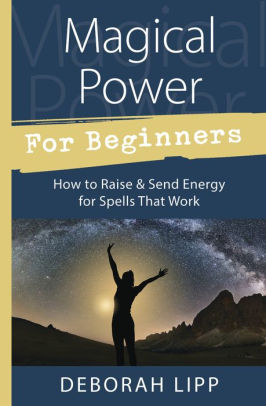Magic 101 books recur at a regular pace in occult publishing. This happens in part because yes, the beginner books sell, especially when made plush with bright colored covers, rich photography or illustrations and the silly-yet-seductive progress of surprising success or at least the fun of personal amusement if magic attempts are met with failure. But these titles also recur for another reason: magick is not a static field of study. It changes. People learn new things about working with these unseen forces and add to the collective body of knowledge at a continuous rate – a rate that has accelerated considerably since 1996 when I first began my own forays into magical study.
Deborah Lipp's book on Magical Powers begins where most magical people start: Wiccan magic. It also immediately differs from most Wicca 101 books. The cover borders on no-nonsense: it is set in dark blues and golds, with no cartoon illustrations and blessedly no babes on broomsticks. Lipp spares the readers yet another set of explanations of the Sabbat cycle and goes straight to the energy work. While she does include the usual saws of picturing the apple and grounding and centering, she expands the overall conversation to quantum magick (time/space), and in a daring move for a Wiccan-identified author, states that she prefers to invoke specific energies rather than call on a generalized Lord and Lady. Overall this isn’t just a good introduction to Wicca, it’s a good introduction to magick – it’s just heavily Wiccan, which will generally work for it but work against it in certain audiences.
One area that Lipp writes on does call for clarity: her explanation of invocation versus evocation barely suggests any difference between the two. Any self-respecting Goetic daemon (never mind the magician that did the evoking) will insist that there damned well is a big difference between invocation and evocation. Perhaps Lipp skates over this because evocation as it is commonly known is usually frowned on in Wiccan traditions. Lipp’s take may simply be some subvert Wiccan theology regarding entity work.
Even with these quibbles, Lipp gives new details and exercises to magickal beginners that more seasoned practitioners might have wished for when they started practice. Her theories on male versus female energy – energy not necessarily gendered but that imitates a male or female orgasm – begs for further experimentation, especially with her excellent points about crafting both intention and energy.
This is the new beginner witchcraft book that we need – one that even some of us old-timers can learn from.
~ review by Diana Rajchel
Author: Lipp, Deborah
Llewellyn, 2017
pp. 303, $15.99

